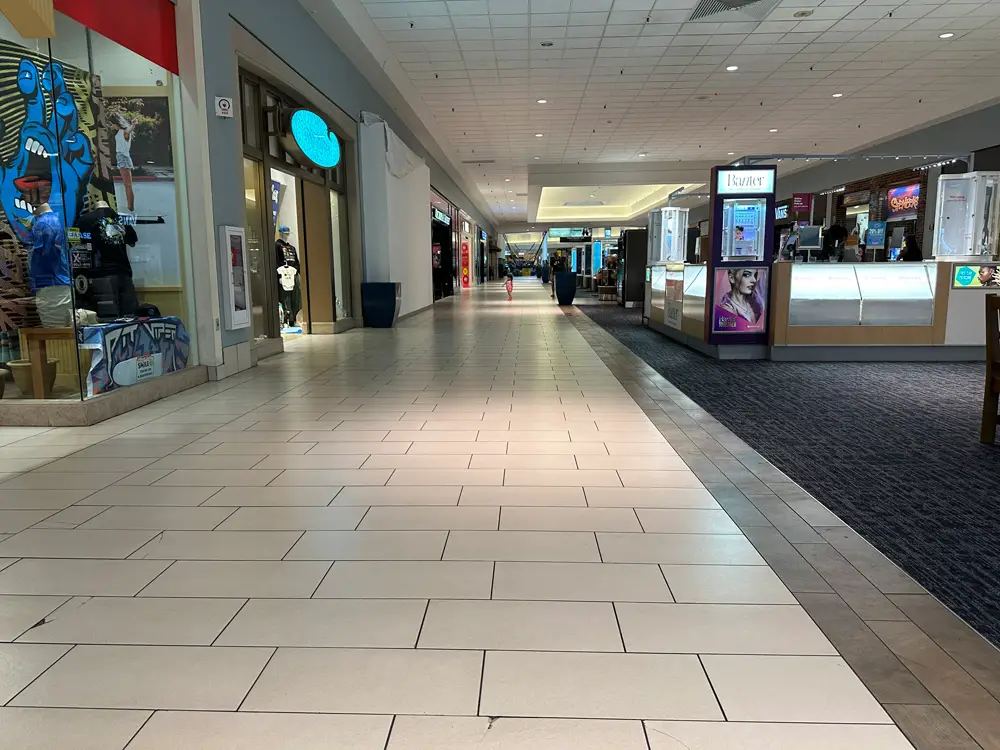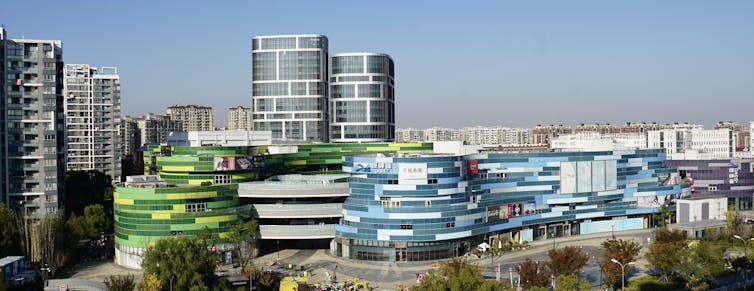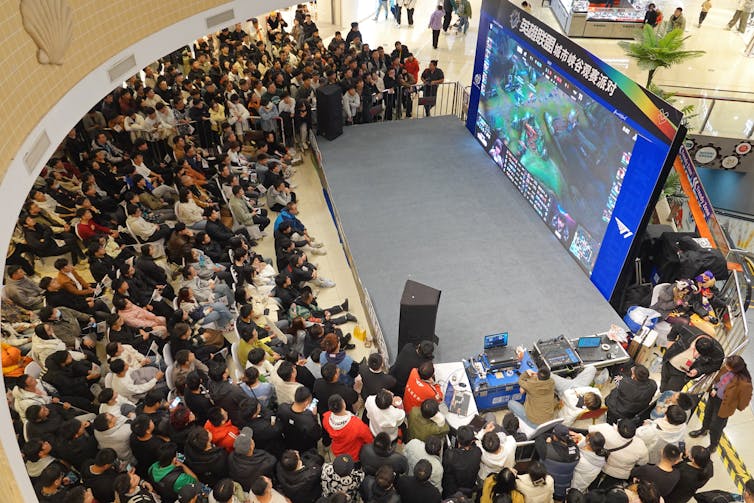
By John Rennie Short
On a recent research trip to China, I wandered through the Oasis Mall in suburban Shanghai. Like many Chinese shopping centers, this complex was filled with empty stores that reflected the end of China’s 30-year-long economic expansion. But there also were surprises.
Along a stretch of the mall’s interior walkway, a cluster of parents and grandparents sat on chairs. They were looking through a plate glass window, watching a dozen 5- to 7-year-old girls practice ballet steps, carefully following their teacher’s choreography. A space initially designed for retail had been turned into a dance studio.
From 1990 through 2020, large, shiny shopping malls embodied China’s spectacular economic growth. They sprouted in cities large and small to meet consumer demand from an emerging middle class that was keen to express its newfound affluence. These centers look familiar to American eyes, which isn’t surprising: U.S. architectural firms built 170 malls in China during this period.

John Rennie Short, CC BY-ND
Like their U.S. counterparts, many Chinese malls have fallen on hard times. The COVID-19 pandemic and the rise of online shopping have devastated foot traffic, leaving the nation with a huge overhang of retail space. But many Chinese malls are being re-imagined by owners and users as palaces of experience – civic areas for communities to meet and interact, with new configurations of public and private space.
As a longtime urban policy scholar, I was fascinated by the new uses I saw for malls in China. In my view, these experiments could become models for new, creative uses of retail space in the U.S., where the mall was invented.
Serving a new consumer class
China opened up to foreign trade and investment less than 50 years ago. Since then, it has become the world’s second-largest economy, surpassed only by the U.S.
Rising incomes and a massive population shift from rural areas to cities have created a growing middle class with significant purchasing power. GDP per capita increased from US$293 in 1985 to $12,500 by 2021.
Today, approximately 350 million Chinese – 25% of the total population – can be considered middle class. More recent economic growth has generated growing income inequality that now is equivalent to U.S. levels.
Malls became a motif of modernity during the country’s economic expansion. They offered consumers year-round protection from heat, humidity, cold and frost, as well as from busy streets and polluting traffic. Malls were safe environments where the steadily increasing numbers of more affluent Chinese families could shop and eat, stroll and meet.
Over the past 30 years, China’s malls have faced economic booms and slumps. For example, the New South China Mall in Dongguan – which is twice the size of Minnesota’s Mall of America, its largest U.S. counterpart – opened in 2005. But most of its 2,300 storefronts remained closed for over a decade as China fought off recession after the 2008 world financial crisis.
China weathered that downturn through aggressive economic stimulus policies, and within a decade it replaced the U.S. as the world’s top driver of economic growth. This expansion buoyed its retail sector, including shopping centers. By 2018, a renovated and modernized New South China Mall was near full occupancy.
Then COVID-19 struck in 2020. The Chinese government adopted a rigid zero-COVID policy, in which local governments could impose lockdowns after detecting just a few cases. Hundreds of millions of people were restricted to their homes for weeks or months at a stretch.
This policy was lifted only in late 2022. China’s economy has yet to fully recover, and many experts argue that it will never again reach its previous rates of growth. An aging population, trade wars with the U.S. and a government focused on centralizing power under the Communist Party are all acting as drags on the economy, and online shopping is drawing consumers away from stores.
As a result, Chinese media reports abound with stories about well-known stores and venerable malls closing. In China, as in the U.S., what scholars once described as the “magic of the mall” has become an “allure of ruins.”
Malls with Chinese characteristics
But the Chinese are making creative use of excess mall space. New users are filling nonretail areas, such as indoor walkways and atriums that now house café tables. Others have become children’s play spaces filled with giant inflatable figures. The Raffles City Mall in Shenzen has a rooftop pet playground, a stage, an art display area and a sun-shaded lawn.
China’s informal economy of food stalls and sidewalk merchants is also filling the void. Although street vending has a long history in China, government officials sought to suppress it in recent years, calling it unsanitary and a throwback to pre-modern times. Now, however, they are encouraging it as a way to reduce growing unemployment, especially among young people, which currently exceeds 20%.
During my trip, I saw small-scale entrepreneurs selling produce, street food and crafts in mall parking lots and around public entrances. The distinction between public and private spaces is being reconfigured as vendors set up stalls in areas that once were open space.
Empty store spaces are also being repurposed. Some have been converted into electric vehicle showrooms, art museums and children’s play centers with dance studios, paddling pools, small skating rinks, gyms and yoga centers. Others have been redesigned as sites for art or cooking classes, or for multiplayer electronic gaming and virtual reality experiences. The Dream Time Mall in Wuhan contains an indoor snow center that offers ski lessons, ice mazes and tubing.

Tang Ke/VCG via Getty Images
I see these experiments as a shift in the meaning of the mall. What began as a cathedral of retail consumerism is becoming a place where people can connect and enjoy individual and collective experiences that aren’t available online.
Some U.S. malls are moving in this direction, but China is doing it on a much larger scale. Just as former Chinese leader Deng Xiaoping once asserted that his government was pursuing its own version of socialism, with “Chinese characteristics,” the U.S.-designed mall is being rewritten with Chinese characters.
![]()
John Rennie Short is Professor Emeritus of Public Policy at the University of Maryland, Baltimore County.





























Pogo says
@John Rennie Short (w/thanx to FL for bringing this forward)
Just this — thank you.
I find it striking how often America invents the world and then reacts with surprise when it sees its own reflection.
Very much, IMO, related
As stated
https://www.google.com/search?q=deming
dave says
And some of these abandoned or soon to close malls are turning into Condo’s and Apartments’. Turning Malls into Neighborhoods or Retail-to-residential conversions.
Bill C says
American Dream Mall in New Jersey offers a striking parallel to the story of the Chinese Mall. American Dream even looked like the Chinese Mall (or vice versa?) at one point in it’s evolution of constantly changing appearance, reworked marketing mix and ballooning debt.
https://www.youtube.com/watch?v=uu2QudztScc
https://nypost.com/2023/09/20/njs-american-dream-mall-saw-losses-quadruple-in-2022/